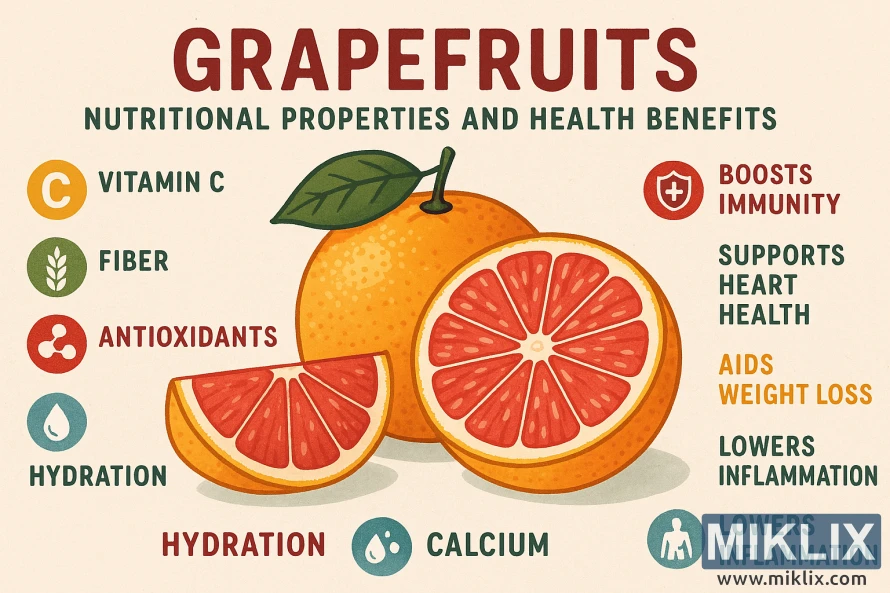The Power of Grapefruit: A Superfruit for Better Health
Published: April 5, 2025 at 5:03:06 PM UTC
Last updated: January 2, 2026 at 5:33:57 PM UTC
Grapefruits are a nutrient-dense citrus fruit known for their vibrant flavor and health benefits. They come from a natural mix of a sweet orange and a pomelo from Barbados. Grapefruits add a delicious twist to many dishes. They are packed with essential nutrients, including high vitamin C content. This vitamin boosts your immune system. Grapefruits also help with heart health and weight loss. This article will explore the health benefits of grapefruits and how they can improve your wellness.

Key Takeaways
- Grapefruits are a rich source of essential nutrients.
- High in vitamin C, they help boost the immune system.
- Consuming grapefruits can promote heart health.
- They may assist in weight management and loss.
- Grapefruits are loaded with antioxidants that combat free radicals.
Introduction to Grapefruits
Grapefruits are tropical citrus fruits known for their sweet and tart taste. They come from the Caribbean and have a long history. Over time, they've become popular for their refreshing taste and health benefits.
Grapefruits are full of vitamins, minerals, and antioxidants. These help our bodies work well. The different colors of grapefruits show there are many types, each with its own taste and health benefits.
Eating grapefruits can make your meals more flavorful and nutritious. They're great in salads, juices, or as a snack. Adding grapefruits to your diet can make healthy eating more enjoyable.
Nutritional Profile of Grapefruits
Grapefruits have a great nutritional profile. They are full of vitamins, minerals, and low in calories. This makes them perfect for any diet. A half of a medium grapefruit has about 41-52 calories, which is great for a healthy lifestyle.
This fruit gives you about 13 grams of carbohydrates and 2 grams of dietary fiber. The fiber helps you feel full, making meals more satisfying. Grapefruit is also packed with vitamin C, giving you 43% of your daily need. It also has 8% of vitamin A's daily value.
Grapefruits are also a good source of minerals like potassium, folate, thiamine, and magnesium. These nutrients help your body work well, keeping you healthy. With their low calories and rich nutrients, grapefruits are a top choice for eating well.

High Vitamin C Content
Grapefruits are packed with vitamin C, giving you a big dose of this essential nutrient. One medium grapefruit can give you 100% of your daily vitamin C needs. This makes grapefruits a great choice for anyone wanting to improve their health.
Vitamin C acts as a strong antioxidant, shielding your cells from damage by harmful germs and viruses. It plays a key role in boosting your immune system, helping you fight off illnesses faster. Adding grapefruits to your meals can bring many health benefits, improving your overall health and well-being.
Grapefruits and Immune System Support
Grapefruits are key in boosting the immune system, thanks to their vitamin C. Vitamin C helps the body fight off infections better. Grapefruits also have vitamin A, which keeps the skin healthy and strong, supporting the immune system.
Also, grapefruits have antioxidants that fight off harmful stress in the body. These antioxidants work well with B vitamins in the fruit, improving health. Studies show eating grapefruits often can make the immune system stronger, helping the body fight off sickness better.
Heart Health Benefits
Eating grapefruits can greatly help your heart. They are full of potassium, a key mineral for keeping blood pressure in check. Keeping blood pressure balanced is key to avoiding heart disease.
Grapefruits also help with cholesterol levels. They have fiber that lowers LDL cholesterol, or the "bad" cholesterol. This helps make your heart healthier.
Studies show that eating grapefruits often can lower blood pressure. This makes grapefruits a great choice for anyone wanting to keep their heart healthy.
Benefits of Fiber in Grapefruits
Grapefruits are packed with dietary fiber, making them great for a balanced diet. Fiber is key for a healthy gut, helping with digestion and avoiding constipation. It also supports good gut bacteria, which is vital for digestion.
Eating grapefruits can help manage cholesterol levels. The fiber in them keeps cholesterol in check, lowering heart disease risk. This shows how important fiber is for heart health.
Fiber also helps with weight loss. It makes you feel full, which helps control how much you eat. Enjoying grapefruits can be a tasty way to help with weight management.
Weight Management and Grapefruits
Grapefruits are great for weight loss because they are low in calories. They have a lot of water, which makes you feel full without eating too much. This is why they're perfect for snacks or meals in a grapefruit diet.
Some people think grapefruits burn fat on their own. But studies say they help when added to a balanced diet. The special compounds in grapefruits might also help your body burn calories better.
- Low-calorie content helps in weight management.
- High water content promotes satiety and reduces hunger.
- Inclusion in a balanced diet may aid weight loss efforts.
Antioxidant Rich Grapefruits
Grapefruits are a great source of antioxidants, which are good for your health. They are full of vitamin C, helping your immune system and skin. Beta-carotene in grapefruits also boosts your vision and immune function.
Lycopene, a key antioxidant in grapefruits, may help fight cancer, like prostate cancer. Eating grapefruits adds flavor to your meals and brings health benefits. Antioxidants in grapefruits help fight off harmful free radicals, reducing the risk of heart disease and some cancers.

Grapefruits and Kidney Stone Prevention
Grapefruits are a tasty way to help prevent kidney stones. They contain citric acid, which stops calcium oxalate and calcium phosphate stones from forming. This is because citric acid makes urine more alkaline and increases citrate levels, making it hard for stones to form.
Grapefruits are also very hydrating, with almost 90% water. Drinking grapefruit juice helps keep the urine diluted. This prevents substances that can cause stones from building up. It's a great way to keep your kidneys healthy.
Eating grapefruits can be a fun and healthy choice to lower kidney stone risk. They help keep you hydrated and provide citric acid. This makes grapefruits a tasty ally in preventing kidney stones.
Hydration Benefits of Grapefruits
Grapefruits are a great choice for staying hydrated, with about 88% water. They are perfect for those who want to drink more water. Eating half a medium grapefruit can help meet your daily hydration needs.
Adding grapefruits to your diet can boost your health. These fruits not only satisfy your thirst but also give you important nutrients. They are a tasty way to keep your body hydrated.
Grapefruit juice, with its 90% water content, helps keep your body's fluid balance. Drinking water-rich fruits like grapefruit keeps you hydrated and healthy. Grapefruit is a tasty and hydrating snack that's good for you.
Dietary Inclusion of Grapefruits
Grapefruits are versatile fruits that can easily find their way into daily meal planning. Their refreshing flavor and vibrant color not only enhance dishes but also provide a plethora of health benefits. This makes them a great addition to any diet. Whether enjoyed raw, cooked, or blended, grapefruits offer various options for delicious recipes.
For simple meal ideas, consider including grapefruits in salads to add a tangy twist. A grapefruit salad with arugula and avocados is both nutritious and flavorful. They can also be enjoyed as a snack, perhaps broiled with a sprinkle of brown sugar for a delightful treat. Smoothies are another fantastic way to combine grapefruit with other fruits and vegetables, resulting in invigorating and colorful blends.
Incorporating grapefruit into breakfast is an option as well. Start your day with a refreshing grapefruit half, or blend it into a morning smoothie alongside spinach and banana. With so many grapefruit dishes available, finding the right recipes that excite your taste buds can be both enjoyable and healthy.
Potential Side Effects of Grapefruits
Grapefruits are good for your health, but they can cause side effects for some people. Their acidity might upset your stomach, which is bad for those with GERD. If you get heartburn, watch how much grapefruit you eat.
It's also important to think about how grapefruits might affect your medicines. They can slow down how your body breaks down certain drugs, like statins and some blood pressure medicines. This might make these drugs work too well, causing side effects. If you're taking these medicines, talk to your doctor before eating grapefruits.
Knowing about these side effects and how they can affect your medicines helps you enjoy grapefruits safely. This way, you can get their health benefits without any problems.
Choosing the Right Grapefruit
Choosing grapefruits can be fun. To pick the best, look for signs of ripeness and quality.
- Color: Choose grapefruits with bright colors. They usually have more nutrients.
- Weight: Heavier grapefruits are juicier. Pick the one that feels heavier for its size.
- Texture: A firm grapefruit with a bit of softness is ripe. A too-soft one might be overripe.
- Aroma: A nice smell means it's fresh and of good quality.
Remember these tips when buying grapefruits. The right choice makes them more enjoyable and healthy.
How to Prepare and Enjoy Grapefruits
Grapefruits burst with flavor and can be enjoyed in many ways. You can slice them in half and eat the segments with a spoon. Or, peel them like an orange for easy snacking.
Adding grapefruit to salads or salsas can really boost the taste. It's tartness makes dishes more exciting.
Eating grapefruit at room temperature can make it taste even better. Try sprinkling sugar or honey on it to balance its tanginess. Grapefruit also goes great with seafood, adding a nice touch to light meals.
Storing grapefruits right is key to keeping them fresh. Store them in a cool, dry place. If you've cut them, put them in an airtight container in the fridge. This keeps them juicy and tasty for longer.

Overall Benefits of Grapefruits
Grapefruits are a standout fruit, packed with vitamins and antioxidants. They are key to boosting overall wellness. Eating grapefruits can help your heart by lowering cholesterol and keeping blood pressure right.
They also boost your immune system with lots of vitamin C. This helps you fight off illnesses better.
Grapefruits are great for weight management too. Their fiber helps you feel full, making it easier to eat healthy. Plus, their natural sweetness is a tasty swap for sugary snacks.
Adding grapefruits to your diet promotes a healthier lifestyle. Their refreshing taste and health perks make them a tasty way to boost your well-being.
Conclusion
Grapefruits are packed with health benefits that can boost your overall well-being. They are low in calories but full of nutrients. This makes them a great choice for any diet, giving you important vitamins and minerals with each bite.
These colorful fruits not only taste great but also help your body in many ways. They can strengthen your immune system and support heart health.
To get the most health benefits, add grapefruits to your daily meals. You can enjoy them sliced, in smoothies, or as a zesty salad topping. Grapefruits are versatile and can enhance many dishes, helping you reach your health goals.
When you add grapefruits to your diet, you're not just eating a tasty fruit. You're choosing a healthier lifestyle. Enjoying grapefruits regularly can lead to a healthier, more vibrant you.

Further Reading
If you enjoyed this post, you may also like these suggestions:
- Beyond Muscle: Discovering the Hidden Benefits of D-Aspartic Acid
- A Clove a Day: Why Garlic Deserves a Spot in Your Diet
- Boost Your Health: The Power of L-Lysine Supplements Explained
